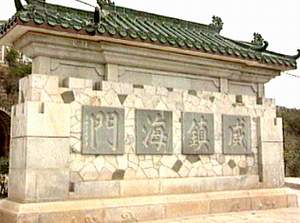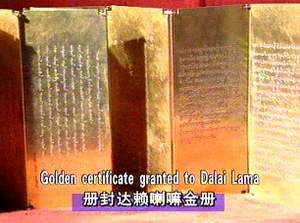 |
 After China was unified at the beginning of the Qing Dynasty, appeared the outstanding politician Emperor Kangxi. He made great contribution to Chinese history by his vigorous measures to make the country strong. After China was unified at the beginning of the Qing Dynasty, appeared the outstanding politician Emperor Kangxi. He made great contribution to Chinese history by his vigorous measures to make the country strong.
Emperor Kangxi studied Confucian classics in his childhood and he worked hard. Thanks to his efforts to incorporate Chinese cultural tradition in his administration, the early Qing Dynasty was a prosperous time.
He began to attend to political affairs at his age of fourteen. He made it a regular institution to handle administrative affairs in person. Every morning he would attend to political affairs in the Gate of Heavenly Purity. Even if he was out of the palace, the memorials submitted from different ministries must be sent to his temporary residence. He persisted in this way of work and this started a tradition of personal attending to politics for emperors in the Qing Dynasty.
When Emperor Kangxi began his reign, the country had not been settled. He first put down the rebellion of three separatist warlords and then put his hand to the problem of Taiwan.
The national hero Zheng Chenggong had performed immortal feats in recovering Taiwan. But after his death his descendants took a separatist road. They asked Qing government for the same political status as that of the tribute-paying foreign countries like Ryukyu and Korea. Emperor Kangxi flatly refused this unreasonable demand. In 1683 Emperor Kangxi named Shilang the navy commander and let him attack Penghu. Zheng Keshuang, Zheng Chenggong's grandson, capitulated. Qing government set administrative organs in Taiwan and fulfilled the unification of China with its part Taiwan.
 In the early Qing Dynasty a Jungar chieftain with foreign countries as backup launched a mutiny and tried to set up an independent state. Emperor Kangxi personally commanded an army to defeat Jungar rebels for three times and thus protected the unity of China. Besides, Emperor Kangxi twice sent troops to attack Yaksa and signed the Treaty of Nerchinsk by which the northern border was defined and the threat from the northeast was removed. In the early Qing Dynasty a Jungar chieftain with foreign countries as backup launched a mutiny and tried to set up an independent state. Emperor Kangxi personally commanded an army to defeat Jungar rebels for three times and thus protected the unity of China. Besides, Emperor Kangxi twice sent troops to attack Yaksa and signed the Treaty of Nerchinsk by which the northern border was defined and the threat from the northeast was removed.
Tibet has had close tie with China. In the Yuan Dynasty it became part of China's territory. At the beginning of the Qing Dynasty Emperor Shunzhi granted the golden certificate and golden seal to Dalai Lama. Emperor Kangxi granted the fifth Bainqen the title of "Bainqen Erdini". Since then, it has become a regulation that the titles of Dalai Lama and Bainqen must be granted by the central government.
The Qing government established the Ministry of National Affairs to deal with affairs concerning ethnic groups. A series of policies suitable for ethnic groups and border regions were adopted.
Under the reign of Emperor Kangxi China with a vast territory, united nationalities and prosperous society became an unprecedentedly consolidated country.
After Emperor Kangxi, Emperors Yongzheng and Qianlong carried down his ruling principles and brought about a period of prosperity. This, however, was only a flourishing time in a Chinese feudal society. Just at the that time, the epoch-making industrial revolution was under way in Europe.
|
|
|
|
|
|
|
 |









